Results
-
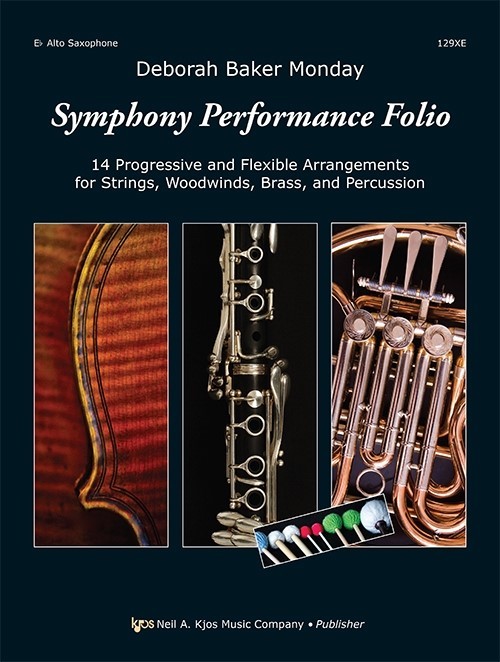 £5.95
£5.95Symphony Performance Folio (Eb Alto Saxophone) - Monday, Deborah Baker
Here's a highly requested collection of folk tunes and classical works flexibly arranged. All arrangements can be played as a full orchestra, or string orchestra, or concert band, or woodwind ensemble, or brass ensemble, or miscellaneous combination that works for you! A percussion book is also included but not required. The pieces in the book progress from grade 2 to grade 4. Arranger Deborah Baker Monday has creatively arranged each piece for concerts or classroom training. Not to be missed! Includes: Chorale (Drese); Lo, How a Rose E'er Blooming (Praetorius); Old French Hymn; Jana Gana Mana (Tagore); Minuet from Water Music (Handel); My Bonny Lass (Morley); Beach Spring (White); Hatikvah; Rondeau from Abdelazer Suite (Purcell); Menuet from Le Tombeau de Couperin (Ravel); Turkish March from The Ruins of Athens (Beethoven); In the Hall of the Mountain King from Peer Gynt Suite (Grieg); Alborada from Capriccio Espagnol (Rimsky-Korsakov); When Johnny Comes Marching Home.
Estimated dispatch 7-14 working days
-
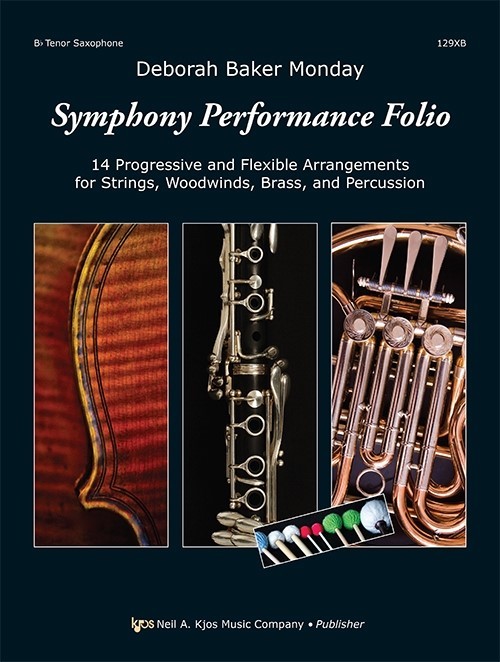 £5.95
£5.95Symphony Performance Folio (Bb Tenor Saxophone) - Monday, Deborah Baker
Here's a highly requested collection of folk tunes and classical works flexibly arranged. All arrangements can be played as a full orchestra, or string orchestra, or concert band, or woodwind ensemble, or brass ensemble, or miscellaneous combination that works for you! A percussion book is also included but not required. The pieces in the book progress from grade 2 to grade 4. Arranger Deborah Baker Monday has creatively arranged each piece for concerts or classroom training. Not to be missed! Includes: Chorale (Drese); Lo, How a Rose E'er Blooming (Praetorius); Old French Hymn; Jana Gana Mana (Tagore); Minuet from Water Music (Handel); My Bonny Lass (Morley); Beach Spring (White); Hatikvah; Rondeau from Abdelazer Suite (Purcell); Menuet from Le Tombeau de Couperin (Ravel); Turkish March from The Ruins of Athens (Beethoven); In the Hall of the Mountain King from Peer Gynt Suite (Grieg); Alborada from Capriccio Espagnol (Rimsky-Korsakov); When Johnny Comes Marching Home.
Estimated dispatch 7-14 working days
-
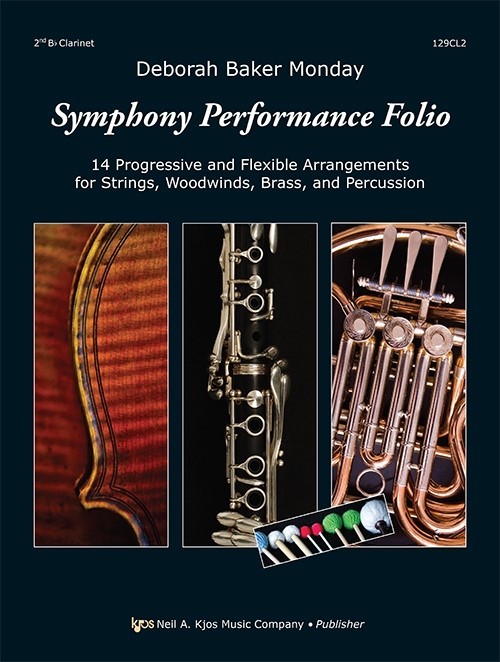 £5.95
£5.95Symphony Performance Folio (2nd Bb Clarinet) - Monday, Deborah Baker
Here's a highly requested collection of folk tunes and classical works flexibly arranged. All arrangements can be played as a full orchestra, or string orchestra, or concert band, or woodwind ensemble, or brass ensemble, or miscellaneous combination that works for you! A percussion book is also included but not required. The pieces in the book progress from grade 2 to grade 4. Arranger Deborah Baker Monday has creatively arranged each piece for concerts or classroom training. Not to be missed! Includes: Chorale (Drese); Lo, How a Rose E'er Blooming (Praetorius); Old French Hymn; Jana Gana Mana (Tagore); Minuet from Water Music (Handel); My Bonny Lass (Morley); Beach Spring (White); Hatikvah; Rondeau from Abdelazer Suite (Purcell); Menuet from Le Tombeau de Couperin (Ravel); Turkish March from The Ruins of Athens (Beethoven); In the Hall of the Mountain King from Peer Gynt Suite (Grieg); Alborada from Capriccio Espagnol (Rimsky-Korsakov); When Johnny Comes Marching Home.
Estimated dispatch 7-14 working days
-
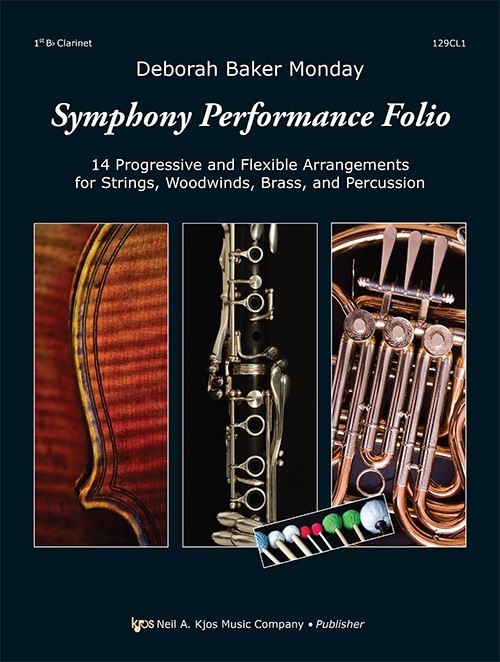 £5.95
£5.95Symphony Performance Folio (1st Bb Clarinet) - Monday, Deborah Baker
Here's a highly requested collection of folk tunes and classical works flexibly arranged. All arrangements can be played as a full orchestra, or string orchestra, or concert band, or woodwind ensemble, or brass ensemble, or miscellaneous combination that works for you! A percussion book is also included but not required. The pieces in the book progress from grade 2 to grade 4. Arranger Deborah Baker Monday has creatively arranged each piece for concerts or classroom training. Not to be missed! Includes: Chorale (Drese); Lo, How a Rose E'er Blooming (Praetorius); Old French Hymn; Jana Gana Mana (Tagore); Minuet from Water Music (Handel); My Bonny Lass (Morley); Beach Spring (White); Hatikvah; Rondeau from Abdelazer Suite (Purcell); Menuet from Le Tombeau de Couperin (Ravel); Turkish March from The Ruins of Athens (Beethoven); In the Hall of the Mountain King from Peer Gynt Suite (Grieg); Alborada from Capriccio Espagnol (Rimsky-Korsakov); When Johnny Comes Marching Home.
Estimated dispatch 7-14 working days
-
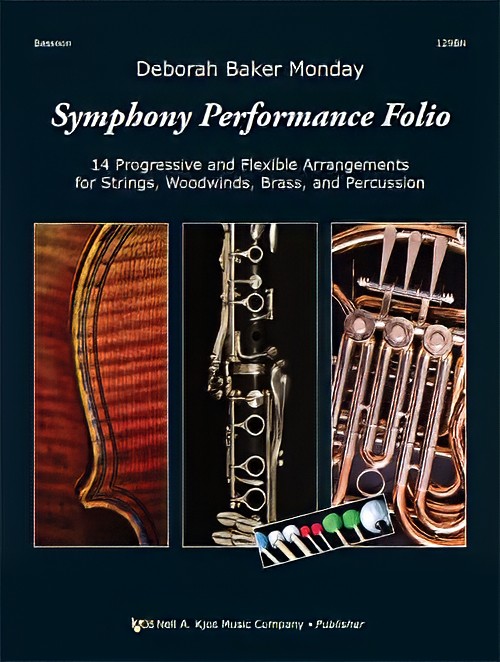 £5.95
£5.95Symphony Performance Folio (Bassoon) - Monday, Deborah Baker
Here's a highly requested collection of folk tunes and classical works flexibly arranged. All arrangements can be played as a full orchestra, or string orchestra, or concert band, or woodwind ensemble, or brass ensemble, or miscellaneous combination that works for you! A percussion book is also included but not required. The pieces in the book progress from grade 2 to grade 4. Arranger Deborah Baker Monday has creatively arranged each piece for concerts or classroom training. Not to be missed! Includes: Chorale (Drese); Lo, How a Rose E'er Blooming (Praetorius); Old French Hymn; Jana Gana Mana (Tagore); Minuet from Water Music (Handel); My Bonny Lass (Morley); Beach Spring (White); Hatikvah; Rondeau from Abdelazer Suite (Purcell); Menuet from Le Tombeau de Couperin (Ravel); Turkish March from The Ruins of Athens (Beethoven); In the Hall of the Mountain King from Peer Gynt Suite (Grieg); Alborada from Capriccio Espagnol (Rimsky-Korsakov); When Johnny Comes Marching Home.
Estimated dispatch 7-14 working days
-
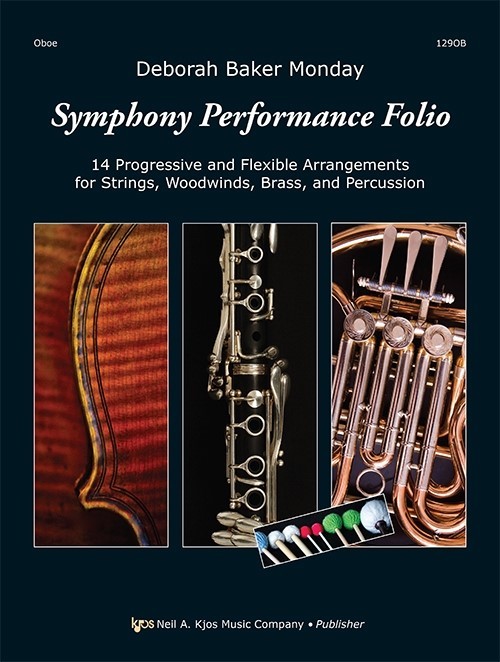 £5.95
£5.95Symphony Performance Folio (Oboe) - Monday, Deborah Baker
Here's a highly requested collection of folk tunes and classical works flexibly arranged. All arrangements can be played as a full orchestra, or string orchestra, or concert band, or woodwind ensemble, or brass ensemble, or miscellaneous combination that works for you! A percussion book is also included but not required. The pieces in the book progress from grade 2 to grade 4. Arranger Deborah Baker Monday has creatively arranged each piece for concerts or classroom training. Not to be missed! Includes: Chorale (Drese); Lo, How a Rose E'er Blooming (Praetorius); Old French Hymn; Jana Gana Mana (Tagore); Minuet from Water Music (Handel); My Bonny Lass (Morley); Beach Spring (White); Hatikvah; Rondeau from Abdelazer Suite (Purcell); Menuet from Le Tombeau de Couperin (Ravel); Turkish March from The Ruins of Athens (Beethoven); In the Hall of the Mountain King from Peer Gynt Suite (Grieg); Alborada from Capriccio Espagnol (Rimsky-Korsakov); When Johnny Comes Marching Home.
Estimated dispatch 7-14 working days
-
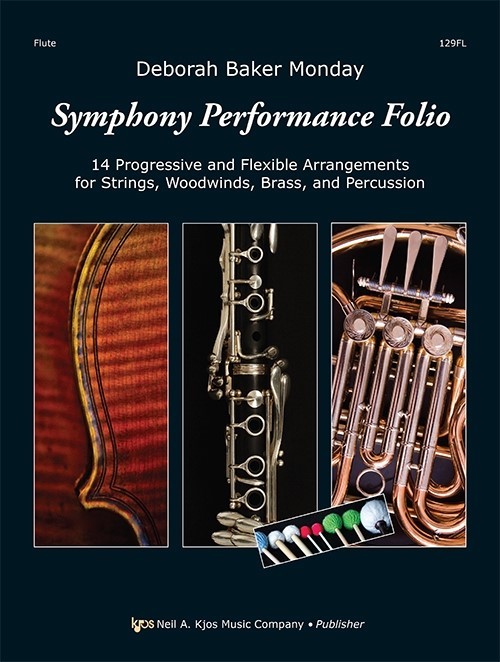 £5.95
£5.95Symphony Performance Folio (Flute) - Monday, Deborah Baker
Here's a highly requested collection of folk tunes and classical works flexibly arranged. All arrangements can be played as a full orchestra, or string orchestra, or concert band, or woodwind ensemble, or brass ensemble, or miscellaneous combination that works for you! A percussion book is also included but not required. The pieces in the book progress from grade 2 to grade 4. Arranger Deborah Baker Monday has creatively arranged each piece for concerts or classroom training. Not to be missed! Includes: Chorale (Drese); Lo, How a Rose E'er Blooming (Praetorius); Old French Hymn; Jana Gana Mana (Tagore); Minuet from Water Music (Handel); My Bonny Lass (Morley); Beach Spring (White); Hatikvah; Rondeau from Abdelazer Suite (Purcell); Menuet from Le Tombeau de Couperin (Ravel); Turkish March from The Ruins of Athens (Beethoven); In the Hall of the Mountain King from Peer Gynt Suite (Grieg); Alborada from Capriccio Espagnol (Rimsky-Korsakov); When Johnny Comes Marching Home.
Estimated dispatch 7-14 working days
-
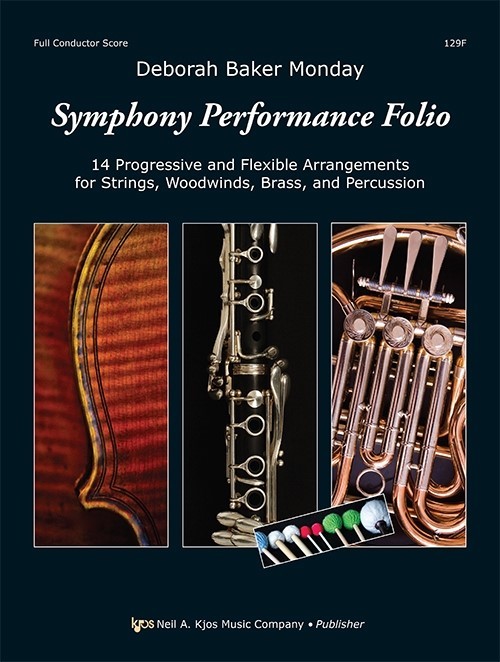 £21.95
£21.95Symphony Performance Folio (Full Conductor Score) - Monday, Deborah Baker
Here's a highly requested collection of folk tunes and classical works flexibly arranged. All arrangements can be played as a full orchestra, or string orchestra, or concert band, or woodwind ensemble, or brass ensemble, or miscellaneous combination that works for you! A percussion book is also included but not required. The pieces in the book progress from grade 2 to grade 4. Arranger Deborah Baker Monday has creatively arranged each piece for concerts or classroom training. Not to be missed! Includes: Chorale (Drese); Lo, How a Rose E'er Blooming (Praetorius); Old French Hymn; Jana Gana Mana (Tagore); Minuet from Water Music (Handel); My Bonny Lass (Morley); Beach Spring (White); Hatikvah; Rondeau from Abdelazer Suite (Purcell); Menuet from Le Tombeau de Couperin (Ravel); Turkish March from The Ruins of Athens (Beethoven); In the Hall of the Mountain King from Peer Gynt Suite (Grieg); Alborada from Capriccio Espagnol (Rimsky-Korsakov); When Johnny Comes Marching Home.
Estimated dispatch 7-14 working days
-
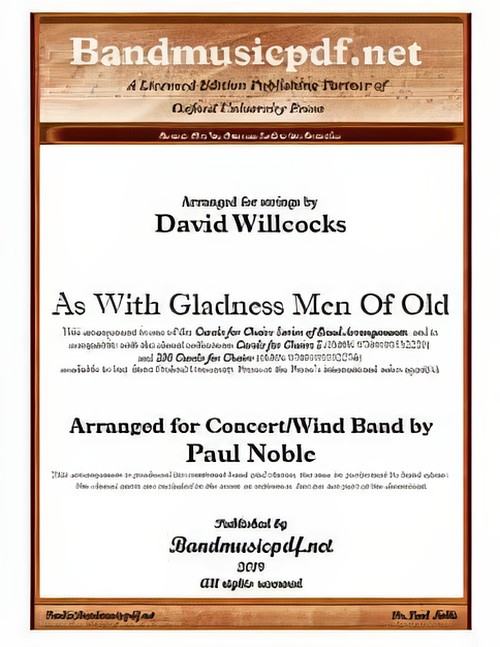 £75.00
£75.00As With Gladness Men of Old (Concert Band with Optional Choir - Score and Parts) - Noble & Willcocks
As with Gladness Men of Old is an Epiphany hymn, written by William Chatterton Dix on 6 January 1859 (Epiphany) while he was ill in bed. Though considered by many as a Christmas carol, it is found in the Epiphany section of many hymnals and still used by many churches. The music was adapted by William Henry Monk in 1861 from a tune written by Conrad Kocher in 1838. The hymn is based on the visit of the Biblical magi in the Nativity of Jesus. The hymn used Matthew 2:1-12 as a theme to compare the journey of the Biblical magi to visit the baby Jesus to each Christian's personal pilgrimage and as a reminder that it is not the value of the gifts, it is the value of giving and adoration to Jesus that is what Christians should seek. It is the only well-known Epiphany hymn or carol about the Biblical magi that avoids referring to them as either magi or kings and does not state how many there were. This arrangement represents one in the Series of Band Arrangements compatible with David Willcocks' Carols for Choirs.
Estimated dispatch 7-14 working days
-
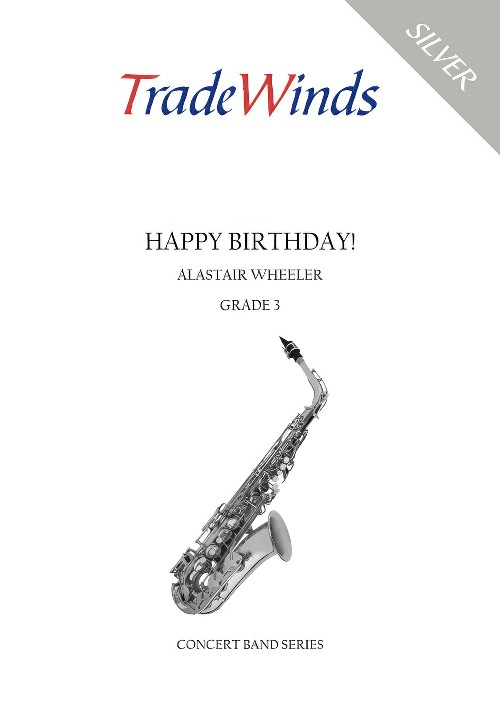 £34.95
£34.95Happy Birthday! (Concert Band - Score and Parts) - Wheeler, Alastair
Every band has had a request to play Happy Birthday, and either turned it down as "not in our pad" or busked a tuneless dirge.? Now you can not only play the tune cleanly but also treat your audience to some jazz - big band swing, blues, a trad bass solo and a final touch of razzamatazz!
Estimated dispatch 7-14 working days
